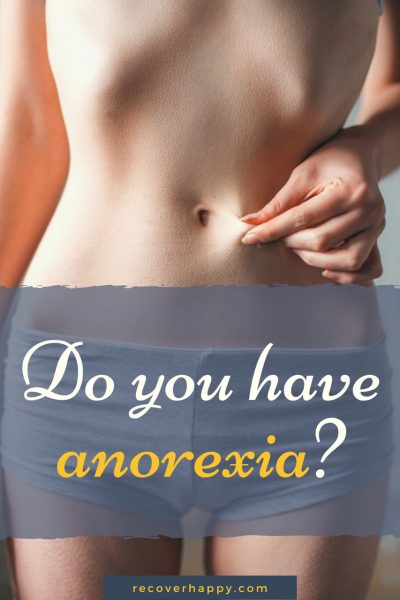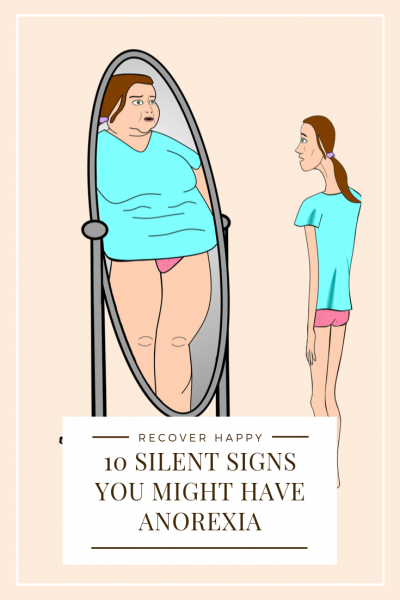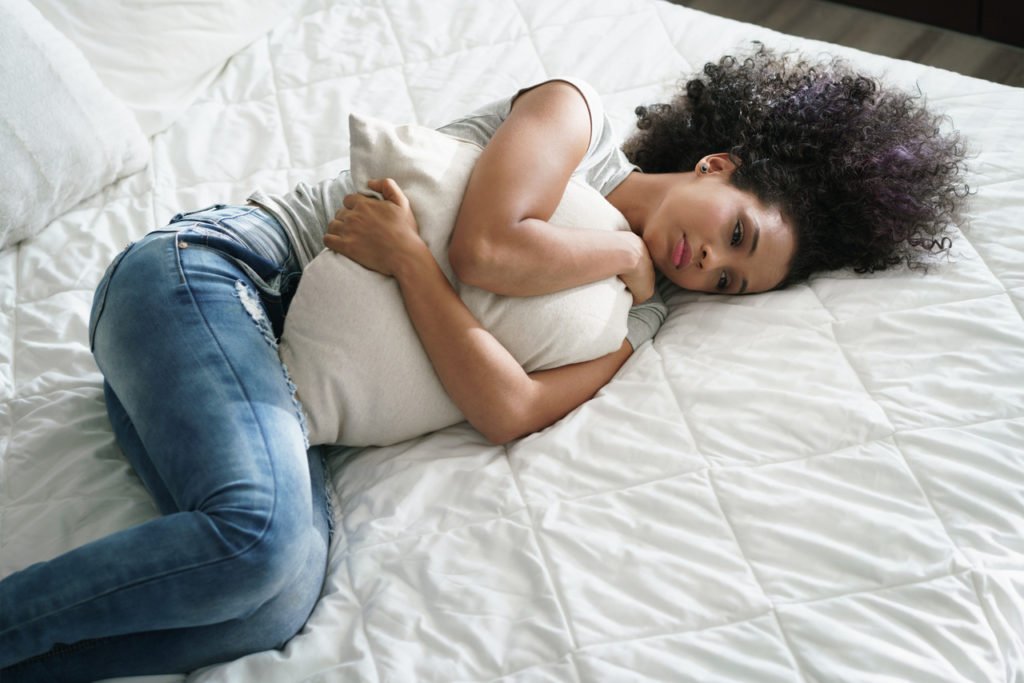10 silent signs you might have anorexia
By Tanja, Psychologist for Eating Disorders & Body Image

Do you know the signs of anorexia? I didn’t know them when I started to develop anorexia.

Hi there!
I’m Tanja. I’m a qualified psychologist specialising in eating disorders, negative body image and body hate. I’m also a survivor of anorexia.
My mission is to help you to end your lifelong struggles with food and your body and inspire you to uncover and embrace you true worth. Read more…
I knew that my eating behaviours were messed up, but I didn’t know exactly what the problem was. I suspected that I was anorexic, but I was under the illusion that only “thin” supermodels suffered from this condition. In any case I felt that I couldn’t be anorexic, because I felt too fat.
When I finally started to investigate anorexia and its symptoms, it felt like a revelation because the symptoms described exactly what I was going through. I threw myself into researching anorexia and read many scientific studies, including a review of 44 years of research that found that anorexia nervosa has the highest mortality rate of any mental disorders.
This made me realise that I was putting my life and my health in danger, which really shook me up.
So that you recognise the symptoms of anorexia earlier than I did, I would like to show you the 10 most common signs of anorexia.
Join the Body Acceptance & Food Freedom Collective
Receive a weekly dose of inspirations to help you make peace with your body and food.
Don’t worry, we hate spam too. You can unsubscribe any time.
Categories
Anorexia
Binge Eating Disorder
Bulimia
Intuitive Eating
Mindfulness
Orthorexia
Strategies for Recovery
1. You can't stop thinking about food
Take a moment and reflect on the last twelve hours to ask yourself how many times you have thought about food.
According to a recent American study, on average people think about food four times, for up to 40 minutes in total, each day.
I used to think about food much more than I do now. In fact, food was the whole focus of my life. I thought about food all day long. Even when I was talking to someone about something completely unrelated, I had images of food in my head. Even at night there was no escape of these thoughts, as I lay awake in bed with a rumbling tummy, fantasising in detail about breakfast the next morning.
2. You love to cook and bake for others
Ironically, even though food was my biggest torment, I loved spending hours in the kitchen cooking three-course meals and baking cakes for my family. Although I was surrounded by the sight, smell and texture of delicious food, I didn’t allow myself to eat a single bite. This made me very proud, as it proved that I was strong enough to resist the temptations of eating.
This association between cooking and anorexia was identified quite early in the famous Minnesota Starving Experiment of 1940, in which participants were put on a semi-starvation diet for over a month. Those who lost 25% or more of their body weight soon became obsessed with cooking. Even after the experiment ended, three of the study participants became chefs.

3. You struggle to eat in front of others
Do you remember the last time when you ate with someone else and really enjoyed it?
Eating with others should involve having a great time together and enjoying their company. However, if you struggle with anorexia, eating with others often involves worrying that others might be judging you because of what, how much or how slowly you are eating. This can lead to anxiety and even finding excuses not to eat with others.
I used to hate eating in front of others, especially on special occasions such as a dinner in a restaurant or a gathering with friends. In the days before such an occasion, I would be anxious that people would stare at me while I was eating and analyse my behaviour. I was particularly scared that someone would find out about my problem and that they would talk about it behind my back. Usually, I would find an excuse not to eat in front of others, such as pretending that I had already eaten or that I had an upset tummy.
4. You have strict rituals around eating
Do you find yourself eating the same food at the same time every day? Do you only eat food that is prepared by yourself? Or do you cut your food into small pieces?
I used to do these and other food rituals every single day. I used them as a way to control the amount of food that I ate and to prevent myself from eating too much. However, in the end I was so trapped by these rituals that I didn’t feel “safe” without them.
5. You are obsessed with how much you weigh
How many times have you used your scale in the last 24 hours?
On average people weigh themselves only several times throughout the year, often in connection with a visit to a doctor or the hospital. However, if you weigh yourself several or even many times per day, this might be a sign of anorexia.
Controlling my weight was one of the most important things in my life. My mood depended entirely on the number on the scale. If it was higher than I expected it to be, even by just 100 grams, I became very depressed and anxious. But if the scale showed a lower number than I expected, I felt happy and energised, as if I could achieve anything.
If you want to know how you can lose the scale, read my blog article Stop weighing yourself.
6. You exercise excessively
Exercise has social, physical and mental health benefits, if done in a balanced way. However, if you exercise more than three hours a day and you experience guilt and stress when you are unable to exercise, this can be a sign of anorexia.
I used to run and visit the gym a lot while I was anorexic, as it helped me to lose “extra grams” or to make up for days when I had eaten too much. The harder my workout was, the prouder and happier I was.

7. You struggle to stay warm
Do you find yourself shivering when no one else is? Even on a hot summer day?
I used to feel cold all the time. It was a strange feeling, like being frozen through on the inside as well the outside. I wore extra layers of clothes and sat in front of the heater, but nothing seemed to help.
To add to my despair, others could tell that I was freezing, as my cheeks and lips had turned blue.
As soon as I gained a little more body fat, the cold feeling started to disappear. This made me realise that fat was a natural and important part of my body.
8. You feel weak
Do you feel weak while simply standing up? Do everyday tasks leave you feeling tired?
When I had anorexia, merely going up the stairs felt like running a marathon and my body shook from exhaustion afterwards. I usually went to bed as early as possible, often finding myself in bed at 8 pm. I didn’t have the energy to go to parties with friends or to do other social activities. The hard reality was that my body was using all its reserves to keep me alive, as it wasn’t getting enough energy.
9. You isolate yourself
The more anorexia took over my life the more isolated I became. And the more I isolated myself, the lonelier I became and the harder it was to be around others.
The reasons for isolation among anorexia sufferers are varied. They might reject emotional support, to avoid sharing their feelings, thoughts and experiences with family or friends. Or they might be ashamed about their situation and afraid that others will judge them.
10. You are getting better and better at lying
Can you remember how often you have told others “no thank you, I have eaten already” or “I’m going to eat later”?
I can’t count the times I made such excuses. Or how often I lied to others when asked if I had lost weight. I didn’t feel the slightest guilt about lying, as this avoided detailed discussions about my weight and made it easier to pursue my anorexic eating habits.
If any of these signs of anorexia sound familiar to you, you don’t need to struggle alone.
Simply get in touch to discuss how I can help you.
It is entirely possible to overcome an eating disorder or body hate –
I have done it, others have done it and so can you!
Join the Body Acceptance & Food Freedom Collective
Receive a weekly dose of inspirations to help you make peace with your body and food.
Don’t worry, we hate spam too. You can unsubscribe any time.
You Might Also Enjoy...

Hi there!
I’m Tanja. I’m a qualified psychologist specialising in eating disorders, negative body image and body hate. I’m also a survivor of anorexia.
My mission is to help you to end your lifelong struggles with food and your body and inspire you to uncover and embrace you true worth. Read more…



